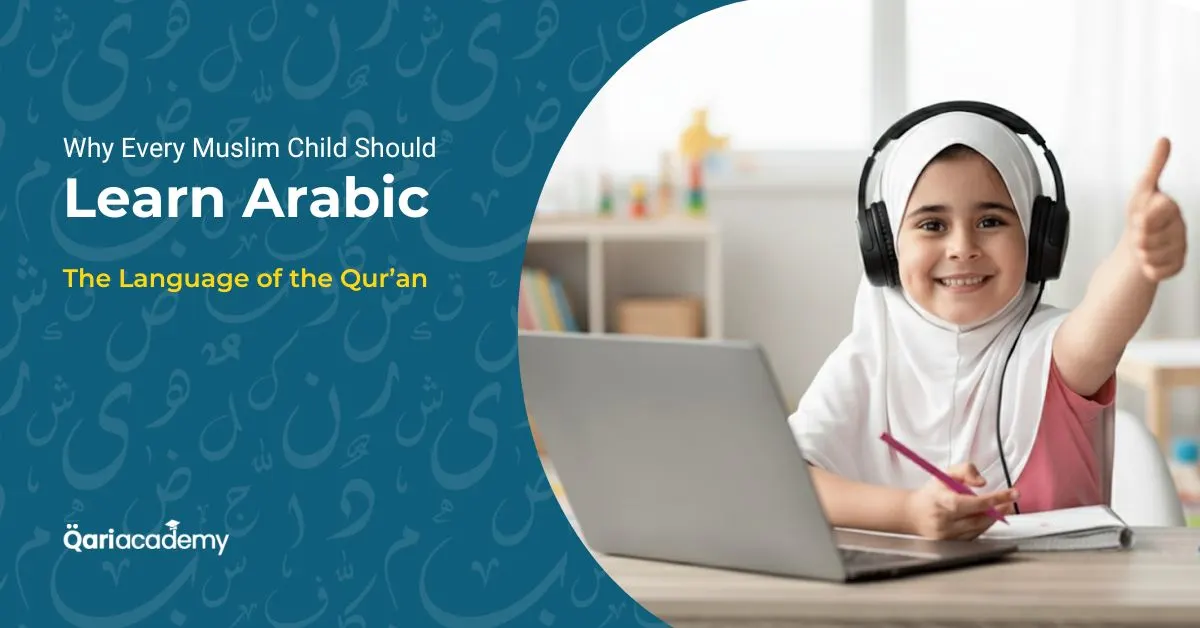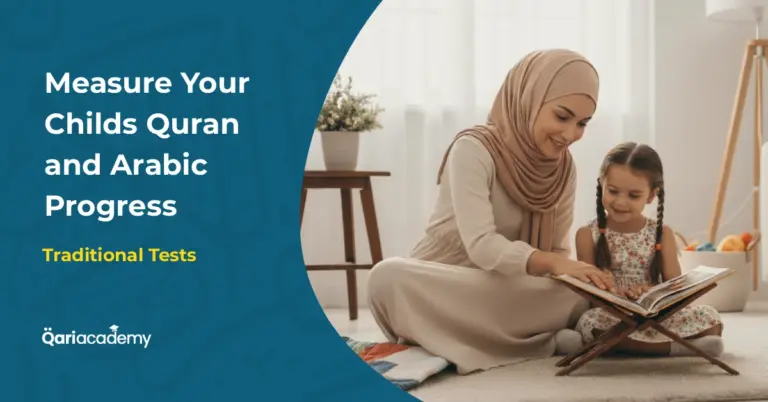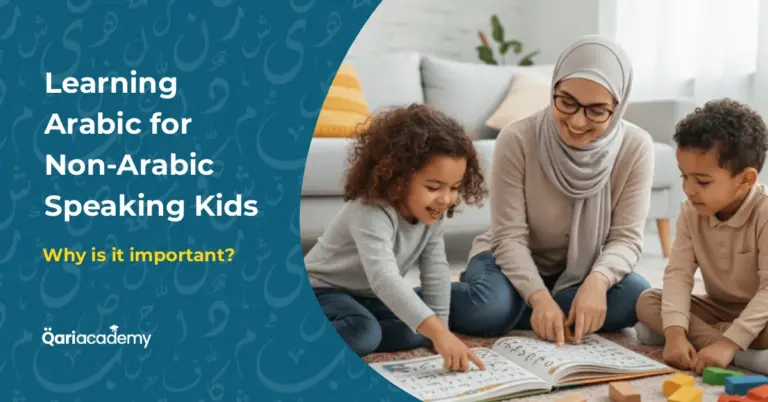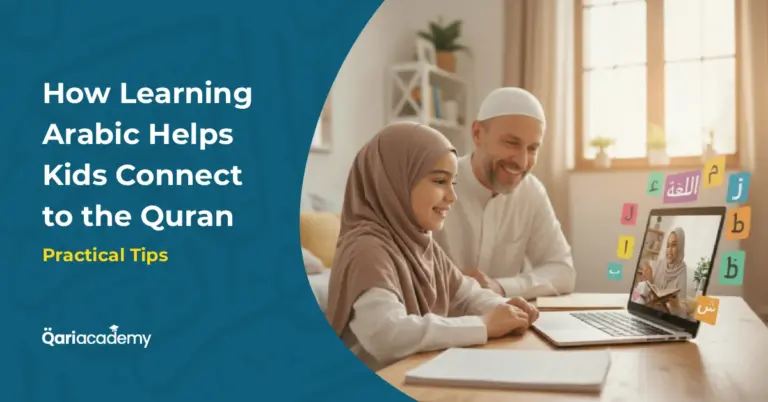
Table of Contents
Introduction
For Muslim families worldwide, programs that help kids learn Arabic are about more than just language — they provide direct access to the Quran and the teachings of Islam. When Muslim children learn Arabic, they connect deeply with their faith, strengthen their Islamic identity, and unlock benefits that go far beyond language skills.
This guide explains the benefits of learning Arabic for Muslim children, why it’s essential for Islamic education, and how QariAcademy makes Arabic learning fun, effective, and accessible for kids of all ages.
Why Kids Should Learn Arabic
There are countless reasons why kids should learn Arabic, but for Muslim families, the importance is tied directly to their faith:
- Arabic for Quran Understanding
The Quran was revealed in Arabic, and while translations are helpful, they can never capture the full depth of meaning. When children understand Arabic, they experience the Quran directly and develop a stronger connection to Allah’s words. - Importance of Arabic in Islam
Arabic is the language of Salah (prayer), Hadith, and centuries of Islamic scholarship. By learning Arabic for Muslim children, parents ensure their kids remain connected to their Islamic roots, no matter where they live. - Arabic Language Benefits for Kids
Beyond religion, Arabic is spoken by more than 400 million people worldwide. It improves memory, boosts academic performance, and gives children access to a rich cultural and historical heritage.
Benefits Beyond Language
The benefits of learning Arabic for Muslim children go far beyond vocabulary and grammar:
- Strengthening Islamic identity in non-Arab countries.
- Building confidence in Quran recitation and Tajweed.
- Enabling participation in Islamic studies, Tafsir, and Fiqh classes.
- Enhancing communication with Arabic-speaking relatives or community members.
- Cognitive Skills, Cultural Awareness, Confidence
How to Teach Kids Arabic Online
Modern tools make it easier than ever to teach kids Arabic online. QariAcademy offers interactive lessons that combine Islamic studies with Arabic learning, designed specifically for non-Arab kids. Parents can benefit from flexible schedules, certified tutors, and customized programs that meet each child’s level.
Tips for Parents Supporting Kids at Home
Learning Arabic doesn’t end when the online class finishes. Parents can play a powerful role in keeping kids engaged:
- Early education: Start early with basics like letters and sounds.
- Diversify Arabic learning methods: Use repetition, visuals, and games for engagement.
- Consistent Practice: Encourage daily Quran reading in Arabic.
- Create a Routine: Set aside short, consistent times each day for Arabic practice.
- Use Everyday Moments: Label household items in Arabic, or practice greetings at home.
- Make It Fun: Use songs, games, and cartoons in Arabic to make learning feel natural.
- Encourage Practice, Not Perfection: Praise effort and progress rather than correcting every mistake.
- Be a Learning Partner: Even if you don’t know Arabic, show curiosity and learn alongside your child.
Common Challenges and How to Overcome Them
Kids may face obstacles when learning a new language. Here’s how to address them:
- Challenge: Short Attention Span
Solution: Keep lessons interactive with visuals, stories, and short activities. - Challenge: Mixing Arabic with Other Languages
Solution: Encourage immersion — dedicate specific times or spaces to “Arabic only.” - Challenge: Lack of Confidence
Solution: Celebrate small wins and give kids opportunities to use Arabic in real-life situations. - Challenge: Limited Practice Outside Class
Solution: Use Arabic storybooks, apps, or family conversations to build consistent exposure. - Challenge: Slow Progress
Solution: Remind both kids and parents that language learning is a marathon, not a sprint.
Why QariAcademy is the Best Choice for Kids’ Arabic Classes
At QariAcademy, our programs are built to make Arabic classes for Muslim children both enjoyable and effective:
- Certified Tutors: Native Arabic speakers trained in teaching kids.
- Quran & Arabic Connection: Lessons link language learning to Quran recitation.
- Flexible Scheduling: Classes designed to suit US, UK, and Canadian time zones.
- Tailored Programs: Options for beginners and advanced learners.
👉 Give your child the gift of Arabic today. Start with a free trial at QariAcademy.com.
FAQ
Q1: Can non-Arab kids learn Arabic easily?
Yes. With interactive teaching methods, Arabic for non-Arab kids is taught step by step, making it fun and effective.
Q2: How does Arabic help with the Quran?
Understanding Arabic allows children to grasp the Quran’s true meaning without relying only on translations.
Q3: What is the best age for Muslim children to learn Arabic?
The earlier the better, but children of any age can begin. Even teens benefit greatly from starting Arabic classes.
Q4: Do online Arabic classes really work?
Yes. Online platforms like QariAcademy provide personalized, one-on-one sessions with expert tutors, making learning effective and engaging.
Conclusion
For every Muslim family, helping their children learn Arabic for kids is one of the most valuable gifts. It builds their Islamic identity, deepens their Quranic connection, and equips them with lifelong skills.
🌟 Start your child’s journey with QariAcademy today — book a free trial and discover how easy and rewarding Arabic learning can be.




